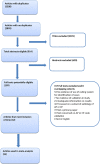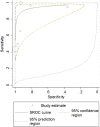The Use of International Classification of Diseases Codes to Identify Patients with Pancreatitis: A Systematic Review and Meta-analysis of Diagnostic Accuracy Studies
- PMID: 30287807
- PMCID: PMC6172207
- DOI: 10.1038/s41424-018-0060-1
The Use of International Classification of Diseases Codes to Identify Patients with Pancreatitis: A Systematic Review and Meta-analysis of Diagnostic Accuracy Studies
Erratum in
-
Correction: The Use of International Classification of Diseases Codes to Identify Patients with Pancreatitis: A Systematic Review and Meta-analysis of Diagnostic Accuracy Studies.Clin Transl Gastroenterol. 2018 Nov 21;9(11):209. doi: 10.1038/s41424-018-0078-4. Clin Transl Gastroenterol. 2018. PMID: 30464255 Free PMC article.
Abstract
Background: Hospital discharge codes are increasingly used in gastroenterology research, but their accuracy in the setting of acute pancreatitis (AP) and chronic pancreatitis (CP), one of the most frequent digestive diseases, has never been assessed systematically. The aim was to conduct a systematic literature review and determine accuracy of diagnostic codes for AP and CP, as well as the effect of covariates.
Methods: Three databases (Pubmed, EMBASE and Scopus) were searched by two independent reviewers for relevant studies that used International Classification of Disease (ICD) codes. Summary estimates of sensitivity, specificity and positive predictive value were obtained from bivariate random-effects regression models. Sensitivity and subgroup analyses according to recurrence of AP and age of the study population were performed.
Results: A total of 24 cohorts encompassing 18,106 patients were included. The pooled estimates of sensitivity and specificity of ICD codes for AP were 0.85 and 0.96, respectively. The pooled estimates of sensitivity and specificity of ICD codes for CP were 0.75 and 0.94, respectively. The positive predictive value of ICD codes was 0.71 for either AP or CP. It increased to 0.78 when applied to incident episode of AP only. The positive predictive value decreased to 0.68 when the ICD codes were applied to paediatric patients.
Conclusion: Nearly three out of ten patients are misidentified as having either AP or CP with the indiscriminate use of ICD codes. Limiting the use of ICD codes to adult patients with incident episode of AP may improve identification of patients with pancreatitis in administrative databases.
Conflict of interest statement
Figures





Similar articles
-
Frequency of progression from acute to chronic pancreatitis and risk factors: a meta-analysis.Gastroenterology. 2015 Nov;149(6):1490-1500.e1. doi: 10.1053/j.gastro.2015.07.066. Epub 2015 Aug 20. Gastroenterology. 2015. PMID: 26299411
-
Reliability of administrative data to identify sexually transmitted infections for population health: a systematic review.BMJ Health Care Inform. 2019 Aug;26(1):e100074. doi: 10.1136/bmjhci-2019-100074. BMJ Health Care Inform. 2019. PMID: 31399425 Free PMC article.
-
Accuracy and utility of using administrative healthcare databases to identify people with epilepsy: a protocol for a systematic review and meta-analysis.BMJ Open. 2018 Jun 30;8(6):e020824. doi: 10.1136/bmjopen-2017-020824. BMJ Open. 2018. PMID: 29961014 Free PMC article.
-
Development and validation of case-finding algorithms to identify acute pancreatitis in the Veterans Health Administration.Pharmacoepidemiol Drug Saf. 2022 Dec;31(12):1294-1299. doi: 10.1002/pds.5549. Epub 2022 Oct 20. Pharmacoepidemiol Drug Saf. 2022. PMID: 36222554 Free PMC article.
-
Accuracy of coding for possible warfarin complications in hospital discharge abstracts.Thromb Res. 2006;118(2):253-62. doi: 10.1016/j.thromres.2005.06.015. Epub 2005 Aug 2. Thromb Res. 2006. PMID: 16081144
Cited by
-
Early Chronic Pancreatitis-Consider Alternatives When There Is Low Diagnostic Confidence: A Concise Commentary.Dig Dis Sci. 2025 Apr;70(4):1584-1585. doi: 10.1007/s10620-025-08989-x. Epub 2025 Mar 21. Dig Dis Sci. 2025. PMID: 40119241 No abstract available.
-
New-onset diabetes secondary to acute pancreatitis: An update.World J Clin Cases. 2022 Oct 26;10(30):10862-10866. doi: 10.12998/wjcc.v10.i30.10862. World J Clin Cases. 2022. PMID: 36338218 Free PMC article. Review.
-
Acute biliary pancreatitis has better outcomes but increased resource utilization compared to acute alcohol-induced pancreatitis: insights from a nationwide study.Ann Gastroenterol. 2021;34(2):253-261. doi: 10.20524/aog.2020.0559. Epub 2020 Dec 7. Ann Gastroenterol. 2021. PMID: 33654368 Free PMC article.
-
Pancreas shrinkage following recurrent acute pancreatitis: an MRI study.Eur Radiol. 2019 Jul;29(7):3746-3756. doi: 10.1007/s00330-019-06126-7. Epub 2019 Apr 12. Eur Radiol. 2019. PMID: 30980124
-
Pancreatitis, Pancreatic Cancer, and Their Metabolic Sequelae: Projected Burden to 2050.Clin Transl Gastroenterol. 2020 Nov;11(11):e00251. doi: 10.14309/ctg.0000000000000251. Clin Transl Gastroenterol. 2020. PMID: 33259158 Free PMC article.
References
Publication types
MeSH terms
LinkOut - more resources
Full Text Sources
Medical
Miscellaneous

